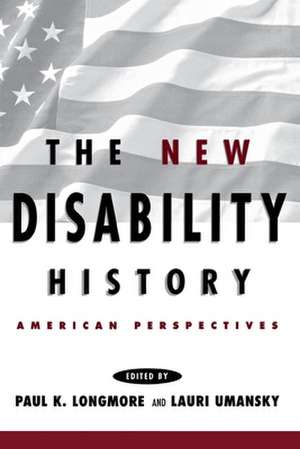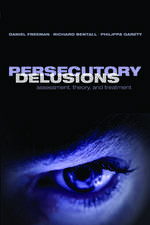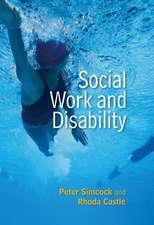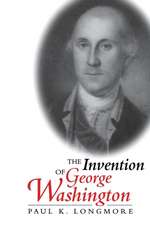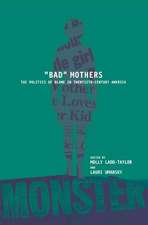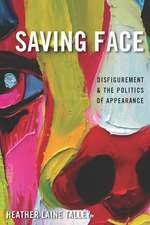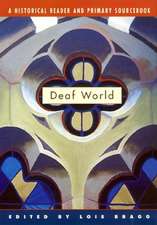The New Disability History – American Perspectives: The History of Disability
Autor Paul K. Longmore, Lauri Umanskyen Limba Engleză Paperback – 28 feb 2001
Disability has always been a preoccupation of American society and culture. From antebellum debates about qualification for citizenship to current controversies over access and "reasonable accommodations", disability has been present, in penumbra if not in print, on virtually every page of American history. Yet historians have only recently begun the deep excavation necessary to retrieve lives shrouded in religious, then medical, and always deep-seated cultural, misunderstanding.
This volume opens up disability's hidden history.In these pages, a North Carolina youth findshis identity as a deaf Southerner challenged in Civil War-era New York. Deaf community leaders ardently defend sign language in early 20th century America. The mythic Helen Keller and the long-forgotten American Blind People's Higher Education and General Improvement Associat
| Toate formatele și edițiile | Preț | Express |
|---|---|---|
| Paperback (1) | 248.17 lei 6-8 săpt. | |
| MI – New York University – 28 feb 2001 | 248.17 lei 6-8 săpt. | |
| Hardback (1) | 531.93 lei 6-8 săpt. | |
| MI – New York University – 28 feb 2001 | 531.93 lei 6-8 săpt. |
Preț: 248.17 lei
Nou
Puncte Express: 372
Preț estimativ în valută:
47.49€ • 49.71$ • 39.29£
47.49€ • 49.71$ • 39.29£
Carte tipărită la comandă
Livrare economică 07-21 aprilie
Preluare comenzi: 021 569.72.76
Specificații
ISBN-13: 9780814785645
ISBN-10: 0814785646
Pagini: 422
Ilustrații: black & white
Dimensiuni: 152 x 228 x 23 mm
Greutate: 0.56 kg
Ediția:New.
Editura: MI – New York University
Seria The History of Disability
ISBN-10: 0814785646
Pagini: 422
Ilustrații: black & white
Dimensiuni: 152 x 228 x 23 mm
Greutate: 0.56 kg
Ediția:New.
Editura: MI – New York University
Seria The History of Disability
Recenzii
"Historians of medicine and technology will find this book an interesting introduction to a highly politicized and novel area of scholarship. This work should inspire research projects into more diverse and less categorized areas of disability."
Technology & Culture "With this work, Longmore and Umansky offer historians, sociologists and other readers intrigued by this area of scholarship an opportunity to understand disabilities as broader and more complex than a single, generic and primarily medical category."
Publishers Weekly "The essays introduce into the historical record a diverse group of people whose views and experiences have been largely excluded, challenge conventional notions of bodily integrity, and represent an important new subfield in American history from which we can expect rich and exciting innovation."
The Historian "The fifteen essays contained in it are thorough, wide-ranging and convincing in their interpretations. . . . This is a powerful contribution to the emancipatory efforts of disabled activists and one that historians should seek to encourage. For this, Longmore and Umansky's collection should be strongly commended."
Journal of American Studies "The New Disability History: American Perspectives is a truly groundbreaking volume and is well-deserving of the praise heaped on its back cover."
H-Net Reviews The essays show us that disability has a place in various parts of our history. While there is an enormous diversity of disability, the collection of essays reminds us of how comparable social perils recur across various disability groups and throughout their particular histories."
Metapsychology
"Historians of medicine and technology will find this book an interesting introduction to a highly politicized and novel area of scholarship. This work should inspire research projects into more diverse and less categorized areas of disability." --Technology & Culture "With this work, Longmore and Umansky offer historians, sociologists and other readers intrigued by this area of scholarship an opportunity to understand disabilities as broader and more complex than a single, generic and primarily medical category." --Publishers Weekly "The essays introduce into the historical record a diverse group of people whose views and experiences have been largely excluded, challenge conventional notions of bodily integrity, and represent an important new subfield in American history from which we can expect rich and exciting innovation." --The Historian "The fifteen essays contained in it are thorough, wide-ranging and convincing in their interpretations... This is a powerful contribution to the emancipatory efforts of disabled activists and one that historians should seek to encourage. For this, Longmore and Umansky's collection should be strongly commended." --Journal of American Studies "The New Disability History: American Perspectives is a truly groundbreaking volume and is well-deserving of the praise heaped on its back cover." --H-Net Reviews The essays show us that disability has a place in various parts of our history. While there is an enormous diversity of disability, the collection of essays reminds us of how comparable social perils recur across various disability groups and throughout their particular histories." --Metapsychology
Technology & Culture "With this work, Longmore and Umansky offer historians, sociologists and other readers intrigued by this area of scholarship an opportunity to understand disabilities as broader and more complex than a single, generic and primarily medical category."
Publishers Weekly "The essays introduce into the historical record a diverse group of people whose views and experiences have been largely excluded, challenge conventional notions of bodily integrity, and represent an important new subfield in American history from which we can expect rich and exciting innovation."
The Historian "The fifteen essays contained in it are thorough, wide-ranging and convincing in their interpretations. . . . This is a powerful contribution to the emancipatory efforts of disabled activists and one that historians should seek to encourage. For this, Longmore and Umansky's collection should be strongly commended."
Journal of American Studies "The New Disability History: American Perspectives is a truly groundbreaking volume and is well-deserving of the praise heaped on its back cover."
H-Net Reviews The essays show us that disability has a place in various parts of our history. While there is an enormous diversity of disability, the collection of essays reminds us of how comparable social perils recur across various disability groups and throughout their particular histories."
Metapsychology
"Historians of medicine and technology will find this book an interesting introduction to a highly politicized and novel area of scholarship. This work should inspire research projects into more diverse and less categorized areas of disability." --Technology & Culture "With this work, Longmore and Umansky offer historians, sociologists and other readers intrigued by this area of scholarship an opportunity to understand disabilities as broader and more complex than a single, generic and primarily medical category." --Publishers Weekly "The essays introduce into the historical record a diverse group of people whose views and experiences have been largely excluded, challenge conventional notions of bodily integrity, and represent an important new subfield in American history from which we can expect rich and exciting innovation." --The Historian "The fifteen essays contained in it are thorough, wide-ranging and convincing in their interpretations... This is a powerful contribution to the emancipatory efforts of disabled activists and one that historians should seek to encourage. For this, Longmore and Umansky's collection should be strongly commended." --Journal of American Studies "The New Disability History: American Perspectives is a truly groundbreaking volume and is well-deserving of the praise heaped on its back cover." --H-Net Reviews The essays show us that disability has a place in various parts of our history. While there is an enormous diversity of disability, the collection of essays reminds us of how comparable social perils recur across various disability groups and throughout their particular histories." --Metapsychology
